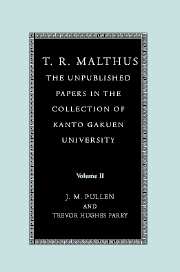Book contents
- Frontmatter
- Contents
- Preface
- Editorial procedures
- List of abbreviations
- Acknowledgements
- 1 Sermons
- 2 Malthus' diary of a tour of the Lake District
- 3 Bullion trade transactions
- 4 An essay on foreign trade
- 5 Essays and notes on Charles I and Mary, Queen of Scots
- 6 Questions and answers on early European history
- 7 Harriet Malthus' diary of a family tour of Scotland in 1826
- 8 Letters to Harriet Malthus from her mother, Catherine Eckersall
- 9 Eight brief miscellaneous items
- Appendix A Additional material not reproduced
- Appendix B Letters to David Ricardo
- Bibliography
- Kanto Gakuen Catalogue
- Index
9 - Eight brief miscellaneous items
Published online by Cambridge University Press: 23 December 2009
- Frontmatter
- Contents
- Preface
- Editorial procedures
- List of abbreviations
- Acknowledgements
- 1 Sermons
- 2 Malthus' diary of a tour of the Lake District
- 3 Bullion trade transactions
- 4 An essay on foreign trade
- 5 Essays and notes on Charles I and Mary, Queen of Scots
- 6 Questions and answers on early European history
- 7 Harriet Malthus' diary of a family tour of Scotland in 1826
- 8 Letters to Harriet Malthus from her mother, Catherine Eckersall
- 9 Eight brief miscellaneous items
- Appendix A Additional material not reproduced
- Appendix B Letters to David Ricardo
- Bibliography
- Kanto Gakuen Catalogue
- Index
Summary
AN ESSAY ON THE ADVANTAGES OF COLONIES
Colonies properly regulated, do not tend to weaken the mother country, but only draw off her exuberant population.
An attempt to prove the general utility of colonies to the mother country, after the very recent loss of our settlements in America, may perhaps appear presumtuous; yet I persuade myself if the subject be impartially, & not too precipitately judged, it will be found that under proper regulations, they are a source of great strength & power to the country which gave them birth.
The fixing settlements in distant regions for the sake of commerce has been a measure almost universally adopted by the wisest & most intelligent nations of antient times; & indeed if we may credit the accounts we have received of the early ages, most of those nations which have made so conspicuous a figure in the historical page will appear to have received their chief support from establishments of this kind. Athens, justly the most celebrated of all the grecian states, derived that strength which made her the terror of surrounding nations from the correspondence she maintained with her numerous colonies in different parts of the world – The country in itself barren & uncultivated, deprived of the support it received from without, instead of holding the highest station, must inevitably have sunk to the lowest in Greece.
- Type
- Chapter
- Information
- Publisher: Cambridge University PressPrint publication year: 2004



